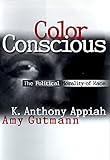Color Conscious : The Political Morality of Race / Kwame Anthony Appiah, Amy Gutmann.
Material type: TextPublisher: Princeton, NJ : Princeton University Press, [1998]Copyright date: ©1996Edition: Course BookDescription: 1 online resource (200 p.)Content type:
TextPublisher: Princeton, NJ : Princeton University Press, [1998]Copyright date: ©1996Edition: Course BookDescription: 1 online resource (200 p.)Content type: - 9780691059099
- 9781400822096
- 323.11
- E185.615 .A77 1996
- online - DeGruyter
- Issued also in print.
| Item type | Current library | Call number | URL | Status | Notes | Barcode | |
|---|---|---|---|---|---|---|---|
 eBook
eBook
|
Biblioteca "Angelicum" Pont. Univ. S.Tommaso d'Aquino Nuvola online | online - DeGruyter (Browse shelf(Opens below)) | Online access | Not for loan (Accesso limitato) | Accesso per gli utenti autorizzati / Access for authorized users | (dgr)9781400822096 |
Browsing Biblioteca "Angelicum" Pont. Univ. S.Tommaso d'Aquino shelves, Shelving location: Nuvola online Close shelf browser (Hides shelf browser)

|

|

|

|

|

|

|
||
| online - DeGruyter On Constitutional Ground / | online - DeGruyter Why Movements Succeed or Fail : Opportunity, Culture, and the Struggle for Woman Suffrage / | online - DeGruyter Imperiled Innocents : Anthony Comstock and Family Reproduction in Victorian America / | online - DeGruyter Color Conscious : The Political Morality of Race / | online - DeGruyter City of Capital : Politics and Markets in the English Financial Revolution / | online - DeGruyter Threats to Democracy : The Radical Right in Italy after the War / | online - DeGruyter American Constitutionalism : From Theory to Politics / |
Frontmatter -- Contents -- Introduction: The Context of Race -- Race, Culture, Identity: Misunderstood Connections -- Responding to Racial Injustice -- Epilogue -- Index
restricted access online access with authorization star
http://purl.org/coar/access_right/c_16ec
In America today, the problem of achieving racial justice--whether through "color-blind" policies or through affirmative action--provokes more noisy name-calling than fruitful deliberation. In Color Conscious, K. Anthony Appiah and Amy Gutmann, two eminent moral and political philosophers, seek to clear the ground for a discussion of the place of race in politics and in our moral lives. Provocative and insightful, their essays tackle different aspects of the question of racial justice; together they provide a compelling response to our nation's most vexing problem. Appiah begins by establishing the problematic nature of the idea of race. He draws on the scholarly consensus that "race" has no legitimate biological basis, exploring the history of its invention as a social category and showing how the concept has been used to explain differences among groups of people by mistakenly attributing various "essences" to them. Appiah argues that, while people of color may still need to gather together, in the face of racism, under the banner of race, they need also to balance carefully the calls of race against the many other dimensions of individual identity; and he suggests, finally, what this might mean for our political life. Gutmann examines alternative political responses to racial injustice. She argues that American politics cannot be fair to all citizens by being color blind because American society is not color blind. Fairness, not color blindness, is a fundamental principle of justice. Whether policies should be color-conscious, class conscious, or both in particular situations, depends on an open-minded assessment of their fairness. Exploring timely issues of university admissions, corporate hiring, and political representation, Gutmann develops a moral perspective that supports a commitment to constitutional democracy. Appiah and Gutmann write candidly and carefully, presenting many-faceted interpretations of a host of controversial issues. Rather than supplying simple answers to complex questions, they offer to citizens of every color principled starting points for the ongoing national discussions about race.
Issued also in print.
Mode of access: Internet via World Wide Web.
In English.
Description based on online resource; title from PDF title page (publisher's Web site, viewed 30. Aug 2021)


